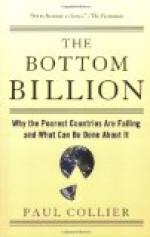Richard Lovelace.
GRIEF
Shakespeare says: “I can easier teach twenty what were good to be done, than be one of the twenty to follow mine own teaching.” This is especially true regarding grief or affliction. “Man was born unto trouble, as the sparks fly upward,” but we bid other people bear their sorrows manfully; we should therefore bear ours with equal courage.
Upon this trouble shall I whet my life
As ’twere a dulling knife;
Bade I my friend be brave?
I shall still braver be.
No man shall say of me,
“Others he saved, himself he cannot
save.”
But swift and fair
As the Primeval word that smote the night—
“Let there be light!”
Courage shall leap from me, a gallant
sword
To rout the enemy and all his horde,
Cleaving a kingly pathway through despair.
Angela Morgan.
From “Forward, March!”
THE RECTIFYING YEARS
Time brings the deeper understanding that clears up our misconceptions; it shows us the error of our hates; it dispels our worries and our fears; it allays the grief that seemed too poignant to be borne.
Yes, things are more or less amiss;
To-day it’s that, to-morrow this;
Yet with so much that’s out of whack,
Life does not wholly jump the track
Because, since matters move along,
No one thing’s always staying
wrong.
So heed not failures, losses, fears,
But trust the rectifying years.
What we shall have’s not what we’ve
got;
Our pains don’t linger in one spot—
They skip about; the seesaw’s end
That’s up will mighty soon descend;
You’ve looked at bacon? Life’s
like that—
A streak of lean, a streak of fat.
Change, like a sky that clouds, that clears,
Hangs o’er the rectifying years.
Uneven things not leveled down
Are somehow simply got aroun’;
The sting is taken from offence;
The evil has its recompense;
The broken heart is knit again;
The baffled longing knows not pain;
Wrong fades and trouble disappears
Before the rectifying years.
Then envy, hate towards man or class
Should from your sinful nature pass.
Though others hold a higher place
Or have more power or wealth or grace,
The best of them, be sure, cannot
Escape the common human lot;
So many smiles, so many tears
Come with the rectifying years.
St. Clair Adams.
TO THOSE WHO FAIL
We too often praise the man who wins just because he wins; the plaudits and laurels of victory are the unthinking crowd’s means of estimating success. But the vanquished may have fought more nobly than the victor; he may have done his best against hopeless odds. As Addison makes Cato say,




